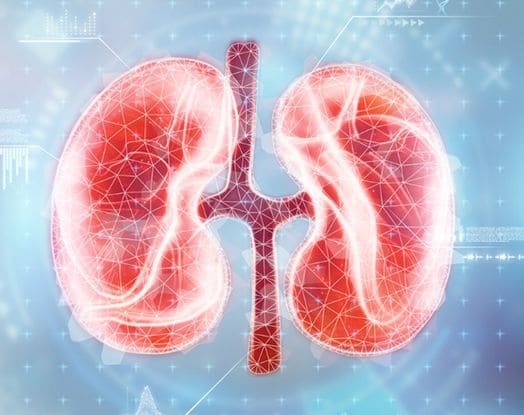Kidney disease, or renal disease, occurs when the kidneys are damaged and unable to filter blood effectively, leading to a buildup of waste and fluid in the body. Common causes include diabetes, high blood pressure, and genetic factors. Symptoms may not manifest until the disease is advanced, but can include fatigue, swelling, and changes in urine output. If left untreated, kidney disease can progress to kidney failure, requiring dialysis or transplantation for survival. Early detection through regular medical check-ups and managing underlying conditions can help prevent and manage kidney disease, preserving overall health and well-being.

Kidneys perform diverse functions critical to physiological balance. They filter blood, eliminating waste, excess fluids, and electrolytes, maintaining optimal composition. Essential for blood pressure regulation, kidneys release renin to manage fluid volume. Erythropoietin secretion stimulates red blood cell production, vital for oxygen transport. Renal function extends to acid-base balance, ensuring pH stability. Activating vitamin D, kidneys contribute to bone health and calcium regulation. Salt reabsorption control impacts fluid balance. Additionally, kidneys filter and excrete drugs, toxins, and metabolic byproducts, playing a pivotal role in overall homeostasis, supporting health by preserving fluid, electrolyte, and nutrient equilibrium.
Some of the common types of kidney diseases are: -
- Chronic Kidney Disease (CKD) - Gradual and irreversible damage, often linked to diabetes, hypertension, or glomerulonephritis.
- Acute Kidney Injury (AKI) - Sudden impairment of kidney function due to infections, toxins, or trauma, typically reversible.
- Polycystic Kidney Disease (PKD) - Genetic disorder leading to the formation of fluid-filled cysts, impacting kidney function over time.
- Glomerulonephritis - Inflammation of the kidney's filtering units (glomeruli), affecting filtration efficiency.
- Nephrotic Syndrome - Excessive loss of proteins in urine, causing edema and hypoalbuminemia.
- Kidney Stones - Formation of mineral deposits that can cause severe pain and affect urinary flow.
- Pyelonephritis - Infection of the kidneys, often arising from bacterial infections in the urinary tract.
Understanding these types is crucial for accurate diagnosis, targeted treatment, and effective management of kidney diseases, emphasizing early intervention for better outcomes.

Yes, alcohol and kidney disease are interrelated. Excessive alcohol consumption can contribute to kidney damage through various mechanisms. Chronic alcohol use may lead to dehydration, elevated blood pressure, direct toxic effects on the kidneys, and electrolyte imbalances. Additionally, liver disease associated with heavy drinking can indirectly impact kidney function. While moderate alcohol consumption is generally acceptable for many, excessive and prolonged intake poses risks to kidney health. Individuals with pre-existing kidney conditions or those at risk should exercise caution and seek medical advice regarding alcohol consumption to prevent potential harm.
Symptoms of kidney disease can vary, and early stages may be asymptomatic. However, as the condition progresses, signs may include:
- Changes in Urination - Altered frequency, color, or foamy urine may indicate kidney issues.
- Fatigue - Kidney dysfunction can lead to anaemia, causing persistent fatigue and weakness.
- Swelling (Edema) - Fluid retention, often seen as swelling in the hands, feet, or face.
- Shortness of Breath - Accumulation of fluid in the lungs can lead to difficulty breathing.
- High Blood Pressure - Kidney disease can contribute to hypertension, further impacting renal function.
- Nausea and Vomiting - Buildup of waste products can cause gastrointestinal symptoms.
- Itching and Skin Rash - Accumulation of toxins can affect the skin, causing itching and rashes.
- Appetite Changes - Loss of appetite or a metallic taste in the mouth may occur.
- Muscle Cramps and Weakness - Electrolyte imbalances can lead to muscle issues.
- Sleep Problems - Difficulty sleeping or restless legs may be linked to kidney dysfunction.
These symptoms underscore the importance of regular health check-ups, especially for individuals with risk factors like diabetes or hypertension, to facilitate early detection and management of kidney disease.
Diagnosing kidney disease involves a comprehensive approach. Medical history, physical examination, and blood tests measuring creatinine and urea nitrogen levels assess kidney function. Urinalysis detects abnormalities. Imaging studies, such as ultrasound or CT scans, provide detailed kidney images. Biopsies may be performed in certain cases. Monitoring blood pressure and screening for diabetes are essential. Early diagnosis enables timely intervention, addressing the underlying causes and implementing treatments like medication, dietary changes, and, in advanced cases, dialysis or transplantation. Regular health check-ups are crucial for detecting kidney disease early and managing it effectively.
- Medication Management - Prescribed medications control underlying conditions causing kidney disease, such as diabetes or hypertension.
- Blood Pressure Control - Maintaining optimal blood pressure is crucial to slow the progression of kidney damage.
- Dietary Changes - A renal-friendly diet, low in sodium, phosphorus, and protein, helps manage symptoms and slow disease progression.
- Dialysis - Haemodialysis or peritoneal dialysis artificially filter and remove waste and excess fluids from the blood when the kidneys can no longer perform these functions.
- Kidney Transplant - Transplantation offers a functional replacement organ for end-stage kidney disease, providing a long-term solution.
Effective treatment of kidney diseases involves a multifaceted approach, including medication, lifestyle modifications, and advanced interventions like dialysis or transplantation. Tailoring treatments to individual needs and addressing the underlying causes are crucial for preserving kidney function and overall well-being. Regular monitoring and early intervention play a pivotal role in improving outcomes and quality of life for individuals with kidney diseases.
Dr. Aneesh Nanda